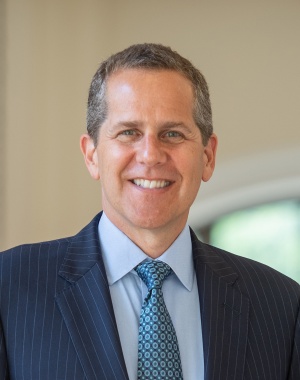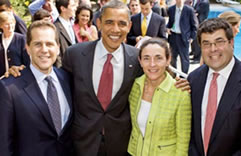
Service History
Assistant secretary for financial institutions, U.S. Treasury Department (2009-10)
Special advisor, President of the United States (1999-01)
Deputy assistant secretary for community development, U.S. Treasury Department (1997-01)
Special assistant, U.S. Secretary of the Treasury (1995-97)
Special advisor and counselor, U.S. Department of State Policy Planning Staff (1994-95)
Law clerk, U.S. Supreme Court Justice David Souter (1993-94)
Law clerk, U.S. District Court Judge (Southern district of NY) Pierre Leval (1992-93)
State & Hill magazine sat down with Michael Barr, who joined the Ford School community as dean on August 1, 2017. We published a short version of our Q&A with him in the fall 2017 edition of the magazine. But for more on Barr's work, interests, and vision for the school, here's the extended version.
S&H: Welcome to the Ford School—we're delighted to have you.
Barr: And I am delighted to join the Ford School! We have an excellent faculty that is doing really cutting-edge research. We have students who are engaged in solving problems in the world and want to commit their lives to making a difference. We have amazing staff who make the school strong. And that combination—that level of excellence in research and that commitment to policy impact—is unbeatable.
S&H: I understand we can thank former dean Ned Gramlich for steering you in our direction?
Barr: Ned and I worked together to bolster community development and advance fair lending policies while he was at the Fed and I was at Treasury. Ned talked a lot about the breadth of excellence and interdisciplinary research at the University of Michigan, so when the Clinton Administration came to an end, and with it my appointment at Treasury, I decided to apply for a position at the law school. I really love working with young people, and I wanted to have the time and the freedom to focus intellectually on the problems I'd been working on in government.
S&H: You and Ned also worked together—well before the subprime mortgage meltdown—to combat abusive practices in the mortgage market. Why was the market so hard to regulate?
Barr: I think a combination of things. There was a general feeling against regulation of all kinds. Alan Greenspan was the chairman of the Federal Reserve at the time and his view was that markets were largely self-correcting. The subprime market in the 1990s was still relatively small in relation to the market as a whole, so it was harder for people to understand the potential systemic consequences of a failure in that market. And other people took the view that a lot of the subprime lending was giving better access to credit than low-income people had before—and if you were too heavy-handed in regulating, it would curtail that access. There's a very strong emphasis on home ownership as the “American dream.”

Family history
Dad's family came to the U.S. from Israel in 1946 aboard the Merchant Marine vessel USS El Reno Victory. They had fled Poland in the 1930s.
Mom's family immigrated to the U.S. from Russia, Latvia, and Lithuania in the 1890s and early 1900s.
S&H: Okay, so I've got to ask. Why doesn't The Big Short mention Ned Gramlich?
Barr: Good question. I think Ned is an unsung hero of the fight against abusive practices in the subprime mortgage market and he was really early on calling out problems in that area. He was working behind the scenes to try to get the Fed to change its policies, and not many people know his name, or know about his work, but I think they should. His book, Subprime Mortgages: America's Latest Boom and Bust, was published by the Urban Institute just as the crisis was beginning to unfold. But it listed a range of reforms Ned been advocating for years.
S&H: With degrees in international relations and law—how did you wind up at Treasury, working with economists like Ned?
Barr: At the end of law school, I clerked for a judge in New York named Pierre Leval, and then for David Souter on the U.S. Supreme Court. And at the end of that clerkship, I was trying to figure out what to do next when I got a call from a guy I had worked for in the Dukakis campaign back in 1988 named Jim Steinberg. And he invited me to go work for him at the policy planning staff at the State Department, which is sort of the in-house think tank at State. I was there for about a year, working on international economic policy issues, which was really fun. Then in January of 1995, Bob Rubin moved over to the Treasury Department and he wanted to figure out ways the Treasury could do more to help low-income communities.
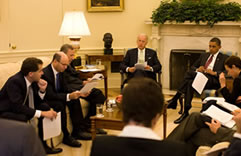
Policy cred
Community Development Financial Institutions Fund: Barr helped to build it during his first stint at Treasury.
Credit Card Accountability, Responsibility and Disclosure Act: Barr helped with development and enactment, giving consumers more time to pay their bills, minimum payment disclosures, and more.
Dodd-Frank Wall Street Reform and Consumer Financial Protection Act: He's known as a key architect of Dodd-Frank.
Consumer Financial Protection Bureau: The bureau is estimated to have recovered $12 billion for 29 million harmed consumers in its first six years of operation.
S&H: Treasury probably isn't the first department people think of when they think about community development…
Barr: One of the things I did during my first stint at Treasury was help to build something called the Community Development Financial Institutions (CDFI) Fund, which invests about $100 million annually in local nonprofit loan funds and community-focused banks as a way of bolstering the supply of capital for urban and rural development. Most banks are extremely cautious about extending home or business loans in low-income communities. But CDFIs offer low-interest business, home, and auto loans in low-income communities around the country. The HOPE Credit Union in the Mississippi Delta, the Detroit Development Fund—all over the country you can now find these terrific organizations doing this work.
S&H: You also worked on the New Markets Tax Credit?
Barr: Yes. We had been working for a long time on a package of proposals to promote economic development in distressed communities, then toward the end of the Clinton Administration that became the New Markets Initiative. In the same way that the United States was focused on investing in developing markets overseas, we wanted to work on developing markets in the United States. And we passed something called the New Markets Tax Credit that gave an incentive to invest in economically distressed communities. It's a little technical…but basically the CDFI Fund could say to somebody who's helping develop an inner city or rural community, “you can get a tax credit worth $X for doing that activity.”
S&H: Then you came to Michigan.
Barr: The possibilities for serious empirical work at U-M really appealed to me. It was work I wanted to do, even with my law background. And I was fortunate that the law school decided to make me an offer.
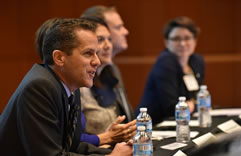
Wonk cred
Behavioral finance: Barr is well known for his work with Princeton psychologist Eldar Shafir and Harvard economist Sendhil Mullainathan on behaviorally informed regulation.
Fintech: This November, he hosted his third conference with the federal Office of Financial Research on financial stability issues. This one explores ways to "harness the upside potential of Fintech while reducing the downside risks."
Interdisciplinary admiration: Barr launched the Center on Finance, Law and Policy to bring together scholars across Michigan to solve wicked problems in finance.
S&H: You've gone back and forth since then—between university and government service. Have the two informed each other?
Barr: Yes, I think that it's worked in both directions. That is, my government service helped me be a better academic—to ask harder, more interesting questions that had some relevance to the world. And being an academic made me smarter and more careful and better as an analyst of policy.
S&H: The Ford School has long believed in the value of that combination—of teaching, research, and service. Since joining the school, you've talked about encouraging even more policy engagement here.
Barr: I think that the Ford School has been quite engaged in the world, and it's one of the reasons that I was really attracted to the idea of becoming dean here. But I'd like to see us do even more—to have even more of an impact in the world, to have even more of our research focused on real-world problems, and to have more opportunities for our students to experience engaged learning, where they can contribute to making a policy impact. I think that if you get those three things right, they can be mutually reinforcing.
S&H: Mutually reinforcing in what way?
Barr: You take cutting-edge research, and then you test ideas on the ground while involving your students. That process teaches students a lot about the world, and about research. It also helps faculty members see the next set of questions to work on, and it can help refine and articulate and demonstrate approaches that can then lead to policies that solve problems and improve conditions for society.
S&H: Building Inclusive Financial Systems, the book you edited in 2007 with colleagues from Brookings and the World Bank, combined some mutually reinforcing insights from academics, policymakers, and practitioners. What did you mean by an “inclusive” financial system?
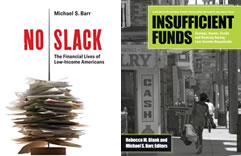
Books by Barr
Financial Regulation: Law and Policy (with Howell Jackson and Margaret Tahyar), Foundation Press
No Slack: The Financial Lives of Low-Income Americans, Brookings Institution Press
Insufficient Funds: Savings, Assets, Credit, and Banking Among Low-Income Households (with former Ford School Dean Becky Blank), Russell Sage Foundation Press
Building Inclusive Financial Systems: A Framework for Financial Access (with Anjali Kumar and Robert E. Litan), Brookings Institution Press
Barr: The way the financial system works now, it is not really well designed for the vast majority of people—and certainly people who have low and moderate incomes have a much harder time in the financial system than people with more wealth. So an inclusive financial system would be one that's aimed at better serving the needs of households and businesses in our society—one that provides a safe and affordable way to save your money; one that provides reasonably priced transaction services so that you can get paid by your employer, store that money, and pay your bills without it being super expensive; and one that provides reasonable access to credit on sustainable terms. One that gives you a chance to succeed in paying back your loans and in living your life and paying for your children's education and buying a home. And we're still a long way off from meeting that.
S&H: During the Obama Administration, you returned to Treasury and are now nationally recognized as one of the key architects of Dodd-Frank...
Barr: As assistant secretary for financial institutions, my job was, among other things, to develop—and then negotiate with Congress and get enacted—Dodd-Frank, which had many components. It reformed our system of supervision, so that it didn't matter whether you called yourself a bank, or an investment bank, or an insurance company—if you were systemically important, you'd be regulated. It set up a system to wind down big firms when they got into trouble. It regulated derivatives. And it launched a number of reforms to protect consumers and investors, including reforms in the mortgage market and credit card industries, and the establishment of the Consumer Financial Protection Bureau.
S&H: Do you think Dodd-Frank regulations will help head off some of the problems that contributed to the financial crisis?
Barr: Yes, I do. I think that regulation can help make the financial system safer and fairer. You're never going to be able to prevent all the booms and busts in the market, but what you can do is make a financial crisis less likely and potentially reduce the severity of a crisis if it comes. You can help to protect consumers and taxpayers more from the risks in the system, and you can help change the incentives in the financial sector to make it less likely that firms want to take on the risks that led to those calamitous events.
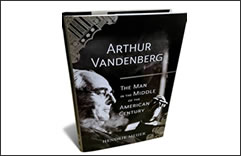
Books on Barr's nightstand
Born to Run by Bruce Springsteen
Hillbilly Elegy: A Memoir of a Family and Culture in Crisis by JD Vance
Arthur Vandenberg: The Man in the Middle of the American Century by Hank Meijer
Poems, by Elizabeth Bishop
Just Mercy: A Story of Justice and Redemption, by Bryan Stevenson
S&H: Dodd-Frank also led to the creation of the Consumer Financial Protection Bureau, which some love, and some hate. What has the bureau done for Americans?
Barr: They've done really important work in reforming the rules for mortgages, for credit cards, for payday lending, for forced arbitration, and they've been doing a lot of work behind the scenes with supervision and enforcement—improving outcomes for consumers. You can measure the impact of that in a lot of ways. One recent analysis says they've recovered about $12 billion in fees for Americans impacted by harmful business practices. So I think there's been an enormous impact, and I think that one of the reasons the bureau is despised in some quarters is that it's been very effective.
S&H: That's huge…
Barr: The Consumer Financial Protection Bureau is something of a miracle. It's a miracle that we were able to get it enacted; it's a miracle that the team—first, Elizabeth Warren, then Rich Cordray—got it off the ground and created a new and robust organization. I got a chance to talk to their first “all-hands” meeting, when the whole team from around the country shows up, and when I got up there, a bunch of the staff shouted out, “Go Blue!” But to see this assemblage of really talented people from around the country was phenomenal.
S&H: You've written a few books, including one with former Ford School Dean Becky Blank. Tell us about one of them…
Barr: Working with the Survey Research Center here at Michigan, we surveyed about 1,000 low-and moderate-income families in the Detroit metro area about their financial service needs and experiences. My book No Slack describes the findings. If something goes wrong—they have a higher cost payday loan, or their car goes bust—these families don't really have a cushion to absorb those extra costs, and that can lead to really disastrous results. The book also suggests ways to improve consumer protections, improve financial education, and improve the kinds of financial products and services that are offered—to help give families a better measure of financial stability.
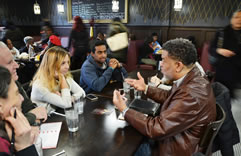
Recent raves
Developing new techniques to detect financial market manipulation, NSF grant with project lead Michael Wellman (Engineering) and co-investigator Uday Rajan (Business).
Detroit Neighborhood Entrepreneurs Project with faculty and students from the Law School, the Ross School of Business, and the Stamps School of Art and Design.
Behavioral Approaches to Understanding Small Business with Princeton psychologist Eldar Shafir.
S&H: In 2009, Nobel economist Richard Thaler wrote about the work you'd done to address social challenges with behavioral interventions.
Barr: Psychology has taught us that human beings don't always make rational choices—that often people are affected by their biases: they can be short-sighted, for example, or suffer from information overload. In government, I was able to get some behavioral interventions enacted into policy. I worked on the Credit Card Act of 2009, for example. Your credit card statement now has a place on it that says, “If you only make the minimum payment, this is what it's going to cost you. If you want to pay it off in three years, this is how much you pay and this is how much you'll save.”
S&H: Talk about the Center on Finance, Law, and Policy. You launched it relatively recently and just held a two-day symposium on behavioral finance. I think your keynote was another Nobel economist, U-M alumnus Robert Shiller.
Barr: We started the center four years or so ago with the idea of bringing together faculty and students from all different departments around the university to think about and work on problems in the financial sector. Some of our work is in the form of research conferences. We've held an annual conference with the Federal Office of Financial Research on different aspects of financial stability. We've done one on big data. We did one on using interdisciplinary approaches to financial stability. And our third one in November was about the new Fintech industry in San Francisco and New York that's developing new products and services and its relationship to stability. We've had other speakers, too—Richard Cordray from the Consumer Financial Protection Bureau came, Neera Tanden from the Center for American Progress came. We've had Larry Summers and Tim Geithner, both former Treasury Secretaries—so a mix of individual speakers. And then we have a monthly brown bag, which we now call a blue bag, where we have working papers from people on campus that can benefit from interdisciplinary commentary.
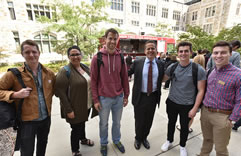
All time faves
Most foods. Especially food truck fare.
Momentum. Barr sails, skis, and runs.
Murphy. For his collegiate professorship, Barr chose to honor Frank Murphy, a U-M alum remembered for "tempering justice with Murphy" throughout his career as a judge and mayor in Detroit, a governor of Michigan, a U.S. attorney general, and a U.S. Supreme Court justice. Murphy wrote a famous dissent in Korematsu v. United States, arguing that by finding Japanese American internment constitutional during WWII, the court had wrongly upheld the "legalization of racism."
S&H: So mostly speakers and conferences?
Barr: We have work on the research side, too. For example, I recently got a National Science Foundation grant with Michael Wellman from U-M's Department of Computer Science and Electrical Engineering and Uday Rajan from the Ross School of Business to work on using big data to understand market manipulation in high-frequency trading markets. And then we have a whole different set of activities that we've started in Detroit—we run an engaged learning/clinic in Detroit with the Ross School of Business, the Law School, and the Stamps School of Art and Design. Faculty and students from those schools are working together to help entrepreneurs in Detroit neighborhoods. Detroit has had a real revitalization of the downtown—but it's hard to get that to reach to the neighborhoods. We're working with neighborhood-based businesses helping them access some of the skills and services they need to take their businesses to the next level.
S&H: Give us an example?
Barr: One of the clients last year was a woman who's running a cosmetics company. She got branding help from the Stamps School; she got marketing help from the Ross School; she got intellectual property help from the Law School—all about advancing her company. So that's been really exciting and rewarding and enjoyable.
S&H: Can you talk a bit about the diversity, equity, and inclusion work at the Ford School?
Barr: I think that one of the strengths of the Ford School historically has been the efforts we've made to recruit a diverse student body and to help students prepare for public service leadership and high-impact careers. While we still have work to do to increase the diversity of our faculty community, and we're quite committed to doing that, we're a community that is not just open to difference, respectful of differences, but cherishes difference and sees it as a strength.
S&H: Since joining the Ford School this August, you've also talked about modeling “a civil civic discourse.” Why is that so important?
Barr: When I was in DC, you would never get anywhere if you said, “I'm 100 percent right. I want 100 percent of what I want.” I think the Ford School can serve as a model for the country—during a time of divisiveness and degradation of public discourse—of ways to have a civil, civic discourse based on the shared goal of trying to make the world better. The strength of our diversity, the way in which we bring empirical evidence, knowledge, and science to bear on public problems. We don't just express views, we express views that are based on research and serious scholarly inquiry, which I think the world really needs right now. That kind of compromise, that give and take, is better overall for the system and it's a way to actually achieve things that help people in their lived experience.
Below is a formatted version of this article from State & Hill, the magazine of the Ford School. View the entire Fall 2017 State & Hill.
